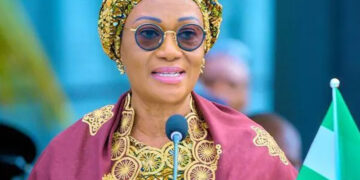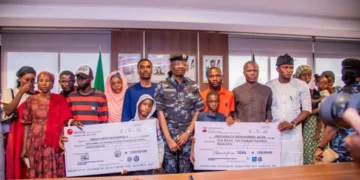Delineation of wards in Warri Federal Constituency, INEC acted to correct imbalance, injustice, says Delta Commissioner for Public Information Aniagwu
*Aniagwu says Itsekiri’s protests unjustifiable
*** Urges Itsekiris to accept INEC’s action, embrace peace
Delta State Commissioner for Works (Rural Roads) and Public Information, Mr. Charles Aniagwu, has backed the recent ward delineation carried out by the Independent National Electoral Commission (INEC) carried out in Warri Federal Constituency.
Aniagwu described the exercise as carried out by INEC as justifiable, adding that it was done to correct the agelong injustice and marginalisation of the Ijaw and Urhobo aborigines by their Itsekiri neighbours in Warri Federal Constituency.
Speaking on the “Morning Show” on Arise News on Sunday, the Commissioner said the exercise was fair and just, adding that the protests by the Itsekiri ethnic nationality over the exercise was unjustifiable.
He said the Itsekiri ethnic nationality had always portrayed Warri as being synonymous with them, adding that Warri belonged to three ethnic nationalities of Ijaw, Urhobo and Itsekiri.
According to him, the situation requires a delicate balance between promoting fairness and equity, and addressing the concerns of all stakeholders, saying by working together and embracing the necessary changes, the area can move towards a more harmonious and representative political landscape.
Aniagwu acknowledged that the opposition to the exercise was mostly from the Itsekiri ethnic nationality, which stood to lose the disproportionate advantages they had long enjoyed.
He explained that the Supreme Court had ruled in favour of re-delineating the electoral wards to ensure fairness, equity, and effective representation across the different ethnic groups.
INEC’s recent action, he said, was in compliance with this judgment and also aligned with earlier internal reviews that flagged significant imbalances in the constituency.
He said that; “The roots of the conflict trace back to longstanding electoral imbalances identified by the Independent National Electoral Commission (INEC) after the 1999 elections”.
The Commissioner added that; “Warri Federal Constituency, which comprises Warri South, Warri South-West, and Warri North local government areas, is home to three major ethnic groups: the Urhobos, the Itsekiris, and the Ijaws. These groups have historically coexisted peacefully and are indigenous to the region”.
“However, ethnic tensions have occasionally arisen over questions of political representation and territorial ownership, some of which have reached the Supreme Court”
The Supreme Court eventually ruled that there was a need to restructure the electoral boundaries within the constituency to promote fairness and equity among the ethnic groups.
“Acting on this judgment, INEC initiated efforts to correct the imbalances, which inadvertently reduced the political advantage previously enjoyed by the Itsekiri.
“This has led to resistance from the Itsekiris, who feel disadvantaged by the reforms, despite their broader intention to foster justice and equitable representation.
“The situation reflects a common human tendency to resist change when it threatens personal gain, even when the change serves the greater good.”
He also said that; “As human beings, it is difficult to accept change, especially when it means losing an undue advantage. But justice and equity must prevail,” he said. “The Itsekiris benefiting from the old system are understandably uncomfortable with the changes, but we must all recognize that the goal is to ensure fairness for every ethnic group in the constituency.”
He also said that; “But I want to express the hope that all stakeholders are going to appreciate that the adjustments were necessary for long-term harmony and fairness among the diverse ethnic groups in the area”.









































